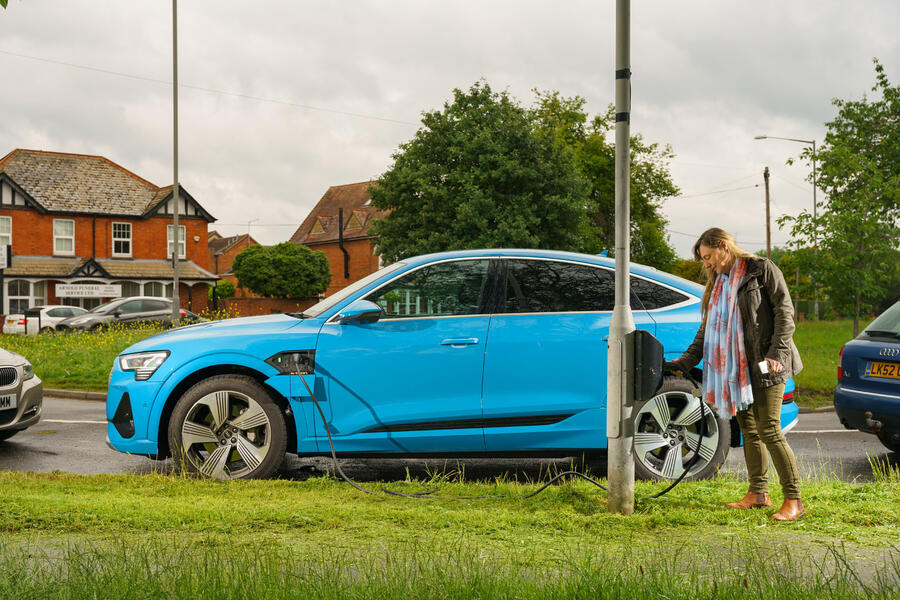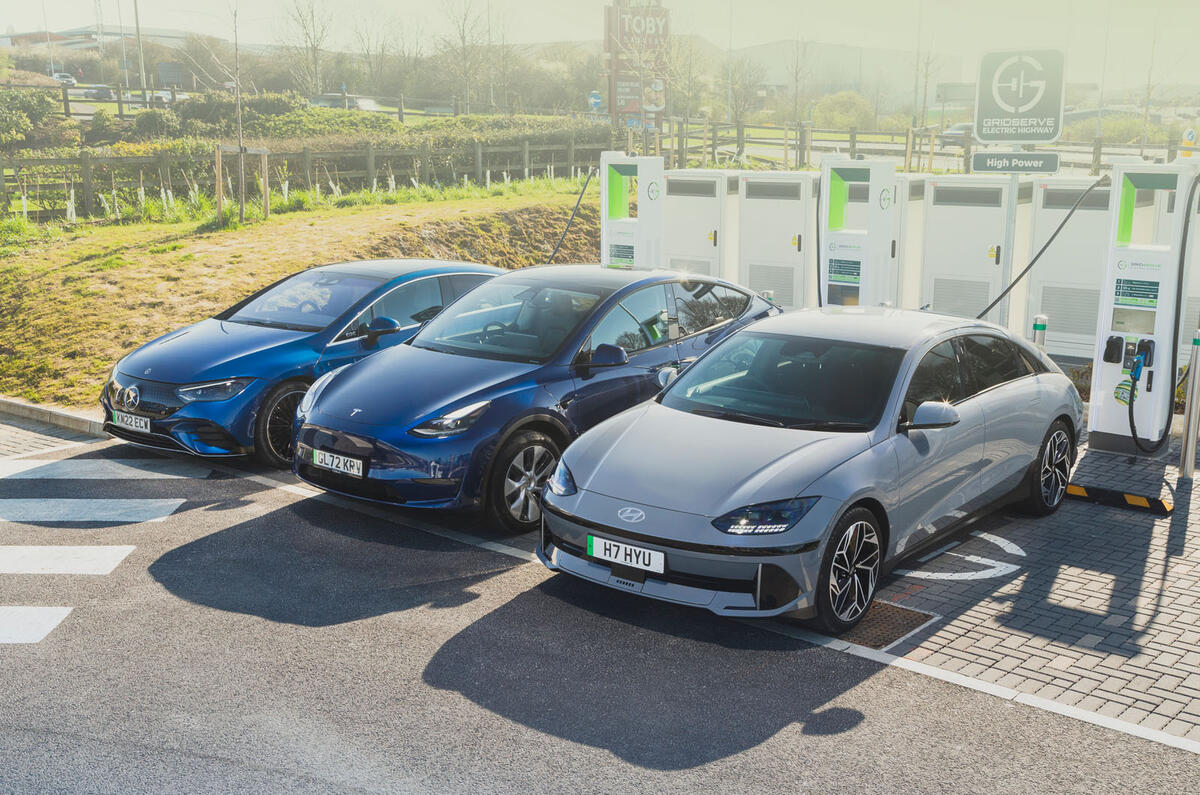The government’s "mixed messaging" around the transition to electric cars threatens the UK's prospects of meeting its transport emissions targets for 2050.
That's the verdict of a new report from the House of Lords Environment and Climate Change Committee titled 'EV Strategy: Rapid Recharge Needed'.
The report identified several key areas of confusion for motorists. These were the perception that ownership of petrol and diesel cars will be banned in 2035, rather than the sale of new petrol and diesel cars; critical minerals (such as lithium) and their procurement; recycling and end of life; and risks to health and safety.
The committee also heard concerns that a “campaign of misinformation” in the mainstream media has affected public opinion of EVs.
Richard Bruce, director of transport decarbonisation at the Department for Transport, told the committee that “there has been an impact from a concerted campaign of misinformation” and that “there is an anti-EV story in the papers almost every day”, “almost all of which are based on misconceptions and mistruths”.
Written evidence submitted by Ford attributed part of the blame for the “vocal anti-EV campaign” to the government for “lacking” focus on the end consumer.
Ford said: “Policy leadership is required from government, which includes clear and consistent messaging of their intent and confidence in the net-zero transition. Delayed policy delivery and inconsistencies damages industry and seeds doubt with the media and the public.”

Mike Hawes, chief of the Society of Motor Manufacturers and Traders (SMMT), ratified this view, saying that “any uncertainty leads to consumers sitting on their hands and sends the wrong message”.
Indeed, the committee noted that prime minister Rishi Sunak delaying the ban on sales of new ICE cars from 2030 to 2035 told the public that achieving net-zero “is going to be hard”.
It summarised: “By emphasising the costs while failing to stress the benefits and robustly counter misinformation, the government is not building public confidence.”
It recommended that the government should take “a more proactive and leading role in communicating a positive vision of the EV transition to consumers” and collaborate with the car industry to achieve this.







Join the debate
Add your comment
I think the government made a huge mistake delaying the ban by 5 more years. As well as sending out the wrong messages, including suggesting there is no urgency to this drive towards a sustainable future, it also creates havoc for the legacy car makers trying to navigate this challenging transition. I am convinced that we will lose some big names in the run up to 2030 (or 2035). Some were inevitable but others may have survived if governments were more decisive. The fact is that the cars, particularly batteries and motors, are progressing at a phenomenal rate now that there is money being made from them. If the infrastructure could keep up we would be at a position in 2030 where there would be no reason anyone would buy an ICE car unless they liked throwing money away. EVs are already twenty times less likely to catch fire than ICE cars, they can have as much range and are considerably cheaper to run. The two areas where there are legitimate reasons to 'fear' making the leap to EVs are time taken to charge and initial purchace price. The first isn't the issue it might seem if the infrastucture is there (which, as an EV owner, I have to admit it is lagging behind EV uptake). If you have a car that has a range of 200 miles and can charge at 100kW+, and you can garantee there is a charger available to use where you need it, with facilities, the reality is that you will not add any time to your journey unless you are not taking sensible rest breaks and are peeing into a bottle! The purchace prices will come down to below ICE cars too. If the world hadn't been rocked by Covid, Putin declaring war on sanity (and Ukraine) and their aftermath, they would be now.
The government should not be relaxing. If they thought the misinformation would go away, they were so wrong. It seems that as the vested interests are backed further and further against the wall, they become ever more desperate to delay the inevitable. Look at the most recent anti-EV story. The Jaguar I-Pace whose drive by wire brakes failed. It was sickening to see how insistent the articles were to ensure we knew it was an EV despite the fact that the incident was nothing to do with it being one. I hate the idea of brake by wire and steer by wire too. I don't want then on my EV. They may be acceptable on an aircraft where they have multiple redundancy, expence no barrier quality and fastideous maintenance, but my car needs good old fashioned mechanical links please.
If anyone wishes to question any of the fact I have stated, I would appreciate it if they would properly research their points before they simply spout the oft debunked misinformation back at me. Thanks and happy future everyone.
I'd love to give owning an EV a try, but they have many everyday compromises and environmental concerns hanging over them, some of which the press don't even report on, so I don't know where this accusation of misinformation is coming from. I've always thought it was the opposite until more balance has started being reported about EVs recently. One could consider that a lot of very powerful and rich people would like EVs to be selling like hot cakes, so that's maybe where this accusation of EV misinformation is coming from.
I'm also not keen on the number of film clips online of EVs suddenly and violently exploding, usually whilst stationary and on charge, or catching fire and continuously burning.
Despite obscene car price inflation of ICE cars in recent years, some might say to make the price of EVs look more competitive without them actually falling like a lot of people were expecting or told, I can buy an ICE car that serves my needs for thousands less than the price of an EV that suits my minimum requirements. The ICE car has less day to day compromises than an EV as well, and might run on e-fuel without modification one day if EVs go the same way as vilified diesels, maybe due to a future appreciation of EV accelerated tyre wear particle polution and battery materials consumption, as well as becoming an overwhelming drain on an already stretched national grid.
I'll walk, use a bicycle or work from home more to help save the planet; to travel long distances I'll buy a fuel efficient ICE car, not an EV at this point in time.
Car price inflation bingo! It's been a while Gav, was beginning to worry about you! Love the way you claim there's no misinformation around about EVs then instantly mention three of them (battery fires, strain on the grid and tyre particle pollution) in the very same comment. Priceless!
Calm down, I know how some people get very emotional and upset when someone has the audacity to have a different opinion to them, especially when backed up with facts and logic (not misinformation).
Whatever you think of the facts I've quoted, anyone with an ounce of common sense will know that people like Sadiq Kahn, energy companies or insurance companies will use those points to tax the EV motorist even more in the future.
And it sounds like you think that huge car price inflation is not something to complain about, so maybe you have a vested interest in hugely overpriced cars, unlike most of the rest of us.
It's also a bit concerning that you notice my rare posts when I don't even recognise your nick-name; maybe you should get out more.
All the best.
We just got our first EV and it has good (power, refinement, cheap overnight charging) and bad (range, charging speed, cost) points. The cost is the big issue there though. Rough numbers as follows:
- list price c.£65k. (Diesel equivalent c.£45k)
- second hand value of 2 year old version c.£32k (2yo diesel equivalent also c£32k)
In other words the EV costs £20k more to buy and loses all of the extra inside 2 years. You'd have to be completely mad to buy one. Which is presumably why they are dumping them out to lease companies for half price. The lease we got costs around £13.5k in total over 2 years and 10k miles. Buying would have cost £33k in depreciation (plus interest!) over 2 years - not many takers for that is no surprise.
Manufacturers were banging on for years that by 2024-25 EVs would be the same cost as ICE and current lithium ion battery prices of c,USD128 per KWh suggest this should be easy by now given you don't need an IC engine or gearbox. Yet list prices for EVs are still astronomically higher than equivalent ICE, and surprise surprise nobody is prepared to pay them.
Oh dear, the anti-EV propaganda is in full swing.
VW Golf cheapest diesel is 33.2k.
VW ID3 cheapest is 35.5k.
Try on TikTok, mate.